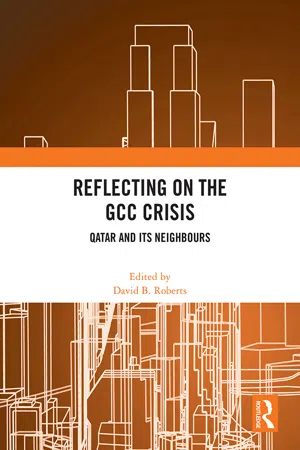
- 128 pages
- English
- ePUB (mobile friendly)
- Available on iOS & Android
About this book
In June 2017, Saudi Arabia, the UAE, Bahrain, and Egypt (the quartet) enacted a diplomatic, economic, and physical blockade of Qatar. Gulf politics has always been fractious, but this stunning political gambit took everyone – Qatari leaders, scholars, the international community – entirely by surprise. The quartet assailed Qatar with a litany of charges mostly relating to its support of a motley array of sub-state actors across the Middle East. However, few out with the quartet thought that Qatar's purported crimes warranted such a unique and all-encompassing punishment. The blockade ended in January 2021 just as it began – out of the blue – without any obvious instigating factors.
The puzzle of the Gulf blockade and its myriad impacts are examined in this volume, which benefits from certain distance. It builds upon early analyses to offer a range of crisp, insightful reflections, many based on new primary sources. The chapters take a multidisciplinary and diverse theoretical approach to the crisis. In this way, the blockade is evaluated from multiple novel angles presenting the most rounded analysis of one of the most surprising and impactful events in the contemporary diplomatic history of one of the world's key strategic crossroads.
The chapters in this book were originally published in the Journal of Arabian Studies.
Frequently asked questions
- Essential is ideal for learners and professionals who enjoy exploring a wide range of subjects. Access the Essential Library with 800,000+ trusted titles and best-sellers across business, personal growth, and the humanities. Includes unlimited reading time and Standard Read Aloud voice.
- Complete: Perfect for advanced learners and researchers needing full, unrestricted access. Unlock 1.4M+ books across hundreds of subjects, including academic and specialized titles. The Complete Plan also includes advanced features like Premium Read Aloud and Research Assistant.
Please note we cannot support devices running on iOS 13 and Android 7 or earlier. Learn more about using the app.
Information
Ontological Security and the Gulf Crisis
1Introduction
Ontological security reveals how crises that garner the attention of states challenge their identity. As the disparate behaviours of states illustrate, identity needs compel them to pursue actions that are seemingly irrational — yet such behaviour must have made sense to the state agents who decided upon that course of action at the time.1
2 What is ontological security?
Ontological insecurity refers to the deep, incapacitating state of not knowing which dangers to confront and which to ignore, i.e. how to get by in the world. When there is ontological insecurity, the individual’s energy is consumed meeting immediate needs. She cannot relate ends systematically to means in the present, much less plan ahead. In short, she cannot realize a sense of agency. Ontological security, in contrast, is the condition that obtains when an individual has confident expectations, even if probabilistic, about the means–ends relationships that govern her social life. Armed with ontological security, the individual will know how to act and therefore how to be herself.13
help maintain identity coherence for each group, which in turn provides individuals with a measure of ontological security. From here it is only a shor...
Table of contents
- Cover
- Half-Title Page
- Title Page
- Copyright Page
- Contents
- Citation Information
- Notes on Contributors
- Introduction
- 1 Ontological Security and the Gulf Crisis
- 2 Society and State in Post-Blockade Qatar: Lessons for the Arab Gulf Region
- 3 Nationalism and Identity in Qatar after 2017: The Narrative of the New National Museum
- 4 European Policies Towards the Gulf: Patterns, Dynamics, Evolution, and the case of the Qatar Blockade
- 5 The Regional Implications of the Gulf Crisis
- 6 The Blockade Against Qatar: A Blessing in Disguise?
- Index